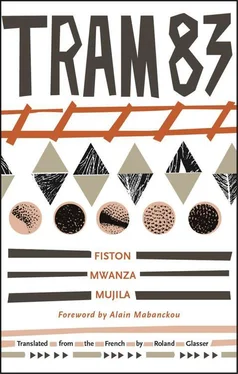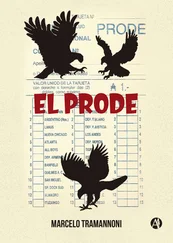Requiem, disoriented:
“Lucien, can we talk about something else?”
The Diva grasped the Negus’s ploy.
“Can you come over here?”
They stepped aside to converse. Requiem seized the opportunity to drink the soup and beer they had left. To appease his ire, he instructed the services of a baby-chick. They hurried toward the mixed facilities.
Lucien stirred us to jealousy. He annoyed us. All the girls held him in high regard. The waitresses and the busgirls whispered that he was a good sort. The mother superior lusted after him. The tourists wanted him to work with them at all costs, and paid his checks.
They came back from the facilities, sweating and laughing, the baby-chick with her crumpled little skirt.
“I feel relieved.”
Lucien and the Diva returned after nearly an hour of conversation.
Requiem let rip at his friend:
“What were you getting up to with our famous Diva?”
The Diva, ironically, to show her mettle:
“I love that! Come dance with your famous Diva.”
Inside the Tram, there was salsa.
“No thanks. I can’t dance.”
How’s it possible a guy that age could have difficulty jiving to beautiful music like this? And what’s more, with such a supreme and beautiful creature as the Diva? What shame we felt! Unheard of since the history of humanity began! You’re acting like we were in the Bible but we’re not. The Negus stared at him. Anger and desolation in his gaze.
Requiem raised his voice:
“Come here! Come dance with me, or I’ll smash your face in!”
The Diva spat on the ground:
“I won’t sully myself.”
Requiem, insolent:
“Bitch!”
Lucien, lost in his texts: “So whenever I write, it feels like my age is reduced by half, or even fifteen, seventeen, perhaps thirty-five years. It feels like I am returned to the belly of my mother and therefore have no one to answer to. I forget, in turn, my ragged clothes and my tuberculosis and my setbacks and my old pairs of shoes.”
Be clear, dear Lucien, what does “returned to the belly” mean? Sink into depression? Refuse to munch the lovely dog kebabs with chopped pistachios? Flee the events that befall you? Not raid the Polygon? Live by sponging off others? That’s crazy behavior, Lucien. You’re lying. You’ve never been yourself since you trod the ground of the City-State! You’ve never been yourself since always!
He hiccupped and continued: “I write therefore I come … But unfortunately, my orgies are never eternal! My conscience always rouses me, disturbs me, tells me ‘Return to your text.’ This is, I think, the most difficult stage in the chronology of a text, to return to it and this time not with the euphoria of a maize beer or even the attitude proper to a night of transgression, but with the honesty and probity of an honest family man.
“This is the moment you realize that the text is without onions, that the soup is excessive, that the carrots aren’t cooked, that the lack of spices considerably affects the advent of a good cuisine. You realize that a major extract is cheating, that such and such a sentence has stinging eyes, that the subordinate clauses are plundering the serenity of the rhythm, that the characters are wrecking their fate and dicing with depression, that the title lacks charm or, in the worst cases, that the story, shall we say the plot, shall we say the framework of the text, doesn’t hold up and that the text must either be redone or else fed to the dogs and other scavengers of the Second Republic who, after having breakfasted, lunched, suppered, siesta’d, dined, and barbecued, wait, tongues hanging out, for the manna which shall fall from this heaven they have vilified, a musical score of madness.”
The Negus, insolently, while lighting a cigarette:
“Bitch!”
“Are you a little shy?”
“Want to dance with me?”
The Diva is like a witch. When she looks at you, not only are you unable to tolerate her gaze but you also feel like she’s acquainted with your life, that she’s more acquainted with it than you, that she knows how you’ll answer, with which baby-chick you slept last night, where and at what time you defecated, for which tourist you’re digging. It feels like she’s even influencing your answers.
“It’s just that I’m a little tired.”
She persisted:
“Humor me, Lucien.”
“Bitch.”
“Please …”
“Bitch.”
For several minutes we remained with the smoke and rage of the Negus, the cowardice and indifference of Lucien writing his nonsense, the beauty and uneasiness of the Railroad Diva, inhaling despair and things impossible to express.
“The bitch.”
Suddenly, screams from inside the Tram, mixed with crying. We rushed inside.
A press of people all about and within the mixed restrooms.
The bodies of two young baby-chicks lay on the wooden floor, pale and lifeless. Two diggers taking advantage or attempting desperately to give mouth-to-mouth. The tourists with their telephones alerting ambulances that came no more, the waitresses requesting their tips, the musicians continuing to play, the baby-chicks quarreling over a tourist.
“Do you have the time?”
“You look like my ex-boyfriend.”
“Give me five shillings.”
“Come, and I’ll teach you some tales for grownups.”
“With or without rubbers.”
“Take me to Warsaw.”
“I’ve got a silicone bust.”
“I’m not like the others who peddle counterfeit feelings. With me, you’ll never forget it!”
The rumors. Three versions: 1) They were knocked up, they had taken pills to abort, the perpetrators of these knockings-up were second-rate tourists. 2) They had taken a deadly poison to say no to the existence they were condemned to lead. 3) They had gone to see a soothsayer to acquire the gift of enticement and he had instructed them not to sample any dog kebabs; yet the entire Tram had seen them snacking on dog, washed down with tequila and tropical vodka. Account favored by the mercenaries who carried away the bodies while chairs, trash bags, shovels, picks, tables, and bottles flew. Psalms 12:45. And yet the night had started well! Injured by a projectile, Lucien under a table, in his notebook, wrote: “Nebulous bodies drift through the dust of their toilet-less lives.”
DIVA: A LOCOMOTIVE LIFE, A REBEL AGAINST THE GALES OF HISTORY AS WELL AS THE GEOGRAPHY OF LOSS. NIGHT OF ALCOHOL: THE DIVA IS A WOMAN WHO GIVES MEN OF MANY NATIONALITIES THE CHANCE TO LEAVE THEIR BODIES FOR THE SPACE OF A TREMOLO.
She bore a curious resemblance to Maria Callas, in her face as much as in her performance and vocal range. Her captivating voice drove the tourists to inextinguishable raptures. Her hairstyle. The tremolo of her laugh and her warmth for the audience. Her eyes that flickered as if she were delving into the pasts, the rackets, the cave-ins, the raids on the Polygon, the long and slow desires to consecrate cults and monuments to the Merovingians and other lecheries: desire to fuck in the dark, transgression raised to the rank of the noblest virtues, transactions and other partnership agreements sealed between two vodkas, merchandise, kebabs that in a certain era were called still lives, secondhand fish dating from the 1990s and shifted from one cold room to another, from one country to another, from one continent to another before winding up in the grubby bar-restaurant-brothels of the City-State, despite the Dissidence declaring it a beacon of national reconstruction and the fight against famine, a revolution of modernity, and so on and so forth.
She had arrived in the City-State almost by chance. She thought she’d reach Nigeria, with the hope of working in a large hotel in Lagos, as she liked to recall in the introduction to each show, but fate had decided otherwise. She’d realized she could only survive in this hardboiled town thanks to her vocal cords, and had attempted the impossible, with such dedication that she made it through. At the start of her career, she was the laughing stock of the Tram — Little Red Riding Hood they called her. Then came the recorded sounds, then her cheery songs, which conferred a certain happiness, then a certain international recognition. What was her ancestry? Her face, Asia — so Thailand, Cambodia, or even India, maybe Pakistan. How did she manage to speak forty-eight languages including Romanian, Etruscan, German, Russian, Wolof, Polish, and Amazigh? Something of the gypsy, or baroness, about her, a sort of fallen bourgeoisie, or pleb seeking modernity, with the appearance of a peacock to crown it all.
Читать дальше












